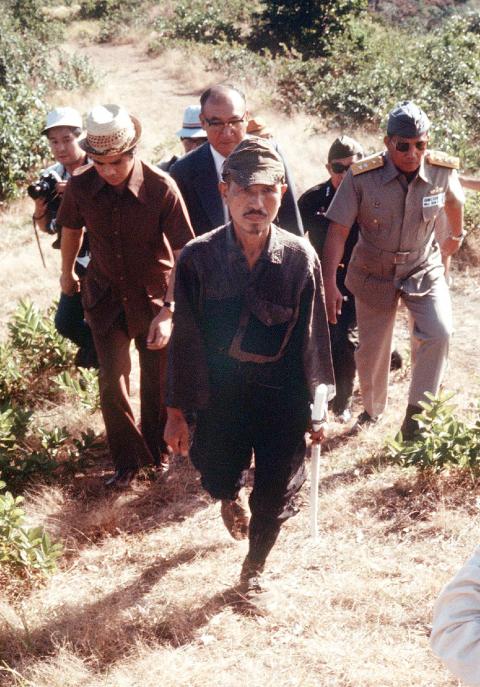A Japanese soldier who hid in the Philippine jungle for three decades, refusing to believe World War II was over until his former commander returned and persuaded him to surrender, has died in Tokyo aged 91.
Hiroo Onoda waged a guerrilla campaign on Lubang Island near Luzon until he was finally persuaded in 1974 that peace had broken out.
Leaflet drops and other efforts to convince him the Imperial Army had been defeated were unsuccessful and it was only a visit from his former commanding officer, who ordered him to lay down his arms, that brought an end to his one-man war.

Photo: AFP
Onoda was the last of several dozen so-called holdouts scattered around Asia, men who symbolized the astonishing perseverance of those called upon to fight for their emperor.
Their number included a soldier arrested in the jungles of Guam in 1972.
Trained as an information officer and guerrilla tactics coach, Onoda was dispatched to Lubang in 1944 and ordered never to surrender, never to resort to suicidal attacks and to hold firm until reinforcements arrived.
He and three other soldiers continued to obey that order long after Japan’s 1945 defeat. Their existence became widely known in 1950, when one of their number emerged and returned to Japan.
The remaining men continued to survey military facilities in the area, attacking local residents and occasionally fighting with Philippine forces, although one of them died soon afterwards.
Tokyo and Manila searched for the remaining two over the next decade, but ruled in 1959 that they were already dead.
However, in 1972, Onoda and the other surviving soldier got involved in a shootout with Philippine troops. His comrade died, but Onoda managed to escape.
The incident shocked Japan, which took his family members to Lubang in the hope of persuading him that hostilities were over.
Onoda later explained that he had believed attempts to coax him out were the work of a puppet regime installed in Tokyo by the US.
He read about his home country in newspapers that searchers deliberately scattered in the jungle for him to find, but dismissed their content as propaganda.
The regular overflight by US planes during the long years of the Vietnam war also convinced him that the battle he had joined was still being played out across Asia.
It was not until 1974, when his old commanding officer visited him in his jungle hideout to rescind the original order, that Onoda’s war eventually ended.
In his formal surrender to then-Philippine president Ferdinand Marcos, Onoda wore his 30-year-old imperial army uniform, cap and sword, all still in good condition.
Asked at a press conference in Japan after his return what he had been thinking about for the past 30 years, he told reporters: “Carrying out my orders.”
Onoda had difficultly adapting to the new reality in Japan and in 1975 emigrated to Brazil to start a cattle ranch, although he continued to travel back and forth.
He later was head of a children’s nature school in northern Japan.

Drug lord Jose Adolfo Macias Villamar, alias “Fito,” was Ecuador’s most-wanted fugitive before his arrest on Wednesday, more than a year after he escaped prison from where he commanded the country’s leading criminal gang. The former taxi driver turned crime boss became the prime target of law enforcement early last year after escaping from a prison in the southwestern port of Guayaquil. Ecuadoran President Daniel Noboa’s government released “wanted” posters with images of his face and offered US$1 million for information leading to his capture. In a country plagued by crime, members of Fito’s gang, Los Choneros, have responded with violence, using car

Two former Chilean ministers are among four candidates competing this weekend for the presidential nomination of the left ahead of November elections dominated by rising levels of violent crime. More than 15 million voters are eligible to choose today between former minister of labor Jeannette Jara, former minister of the interior Carolina Toha and two members of parliament, Gonzalo Winter and Jaime Mulet, to represent the left against a resurgent right. The primary is open to members of the parties within Chilean President Gabriel Boric’s ruling left-wing coalition and other voters who are not affiliated with specific parties. A recent poll by the

TENSIONS HIGH: For more than half a year, students have organized protests around the country, while the Serbian presaident said they are part of a foreign plot About 140,000 protesters rallied in Belgrade, the largest turnout over the past few months, as student-led demonstrations mount pressure on the populist government to call early elections. The rally was one of the largest in more than half a year student-led actions, which began in November last year after the roof of a train station collapsed in the northern city of Novi Sad, killing 16 people — a tragedy widely blamed on entrenched corruption. On Saturday, a sea of protesters filled Belgrade’s largest square and poured into several surrounding streets. The independent protest monitor Archive of Public Gatherings estimated the

Irish-language rap group Kneecap on Saturday gave an impassioned performance for tens of thousands of fans at the Glastonbury Festival despite criticism by British politicians and a terror charge for one of the trio. Liam Og O hAnnaidh, who performs under the stage name Mo Chara, has been charged under the UK’s Terrorism Act with supporting a proscribed organization for allegedly waving a Hezbollah flag at a concert in London in November last year. The rapper, who was charged under the anglicized version of his name, Liam O’Hanna, is on unconditional bail before a further court hearing in August. “Glastonbury,